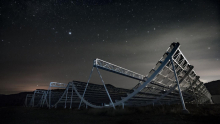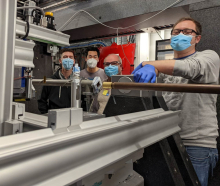
Highlighting women in STEM to engage youth
“Les STIM au féminin” is a new campaign geared towards high school and cegep-level youth which highlights the initiatives of women in STEM and raises awareness about pathways and careers in science through a series of informative videos.

New paper explores four nearby fast radio burst sources
Fleeting blasts of energy from space, known as fast radio bursts (FRBs), are a cosmic enigma. A Canadian-led international team of researchers has published new findings suggesting that supernovae are the predominant contributors to forming sources that eventually produce FRBs.

McGill research included in Québec Science’s top 10 best of the year
Research conducted by McGill researchers ranks among the year’s best, according to Québec Science magazine.
The magazine has published its annual top 10 list of the province’s most groundbreaking scientific discoveries, and three have ties to McGill researchers.
The three studies affiliated with McGill researchers address some of the world’s most pressing challenges: extreme climate change, treatment for cancer patients, and the quality of seawater.

Hanadi Sleiman awarded 2024 E. W. R. Steacie Award
Chemistry Professor and Canada Research Chair in DNA Nanoscience Hanadi Sleiman has received the 2024 E. W. R. Steacie Award from the Chemical Institute of Canada. This award is presented annually to a scientist who has made a distinguished contribution to the field of chemistry while working in Canada.

How does one species become many?
Evolutionary biologists have long suspected that the diversification of a single species into multiple descendent species – that is, an “adaptive radiation” – is the result of each species adapting to a different environment. Yet formal tests of this hypothesis have been elusive owing to the difficulty of firmly establishing the relationship between species traits and evolutionary “fitness” for a group of related species that recently diverged from a common ancestral species.

McGill launches Collaborative for AI and Society
New efforts to mobilize around the challenges and opportunities of AI are taking shape at McGill. On December 4, a new McGill Collaborative for AI & Society (McCAIS) held an internal launch event at the McGill Faculty Club, where more than 70 participants from across the McGill campus gathered for an afternoon of collaboration and discussion.

McGill launches Canada Award to offset tuition increase for Canadian undergraduate students
McGill University is launching a $3,000 Canada Award to offset tuition increases for Canadian undergraduate students from outside Quebec in certain disciplines. Approximately 80% of new Canadian students from outside Quebec coming to McGill will be eligible for the new award.
Details of the award, including the programs eligible for the award, will be available on McGill's Undergraduate Admissions website by December 22, 2023.

Interview with Physics Professor Victoria Kaspi in Nature
In a new interview with Nature, Physics Professor and Shaw laureate Victoria Kaspi reflects on the inaugural Hong Kong Laureate Forum and how researchers can foster communication across different generations of scientists.
What was the most common question students asked at panel discussions?

Fighting disinformation in Quebec
Until now, most disinformation research, datasets, and tools to protect users like bot detectors, have only included English-language social media. This lack of linguistic diversity leaves Francophone internet users in Quebec and beyond more vulnerable to disinformation as the phenomenon becomes increasingly pervasive in online spaces.

Stuck in traffic: Researchers identify cellular traffic jams in a rare disease
Researchers zero in on spinocerebellar ataxia type 6, a disease that disrupts brain function

What skin piercings can teach us about environmental change
In a new study from McGill University, researchers bring science into an unexpected setting: a tattoo parlor. In this first characterization of the human piercing microbiome, the uniquely human cultural practice of piercing serves as a model system to help us better understand how biological communities (re)assemble after catastrophic environmental disturbances.

A first look inside Li-ion batteries
What if you could charge your electric vehicle in the same amount of time it takes to fill a tank of gas?

Rustum Choksi: Winner, Principal’s Prize for Excellence in Teaching (Full Professor)
Students coming from high school often arrive with specific – and mistaken – expectations of the mathematics classroom. In Rustum Choksi’s courses he emphasizes a pedagogical paradigm shift, whereby mathematics is not about memorization nor symbolic manipulations and calculations but rather a beautiful and diverse discipline which is often a means to understanding our complex world.

Martin Grant earns Morty Yalovsky Lifetime Achievement Award
Early in his career in physics, Martin Grant thought he had it all figured out.
“When I started, I said to myself ‘well, this is good. Nobody’s going to tell me what to do,” said Grant, Emeritus James McGill Professor and former Dean of the Faculty of Science. “I’ve got the world’s greatest postdoc – me – and I’ll be able to do all the projects that I want to do pretty much by myself.”

The Hackathon returns to McGill campus
On November 3-5th, the McGill Physics Hackathon held its eighth annual event in person at the Rutherford Physics Building. The event attracted around 150 hackers, from CEGEP and undergraduate backgrounds, who joined forces to produce spectacular projects.
Congratulations to all those who participated!
